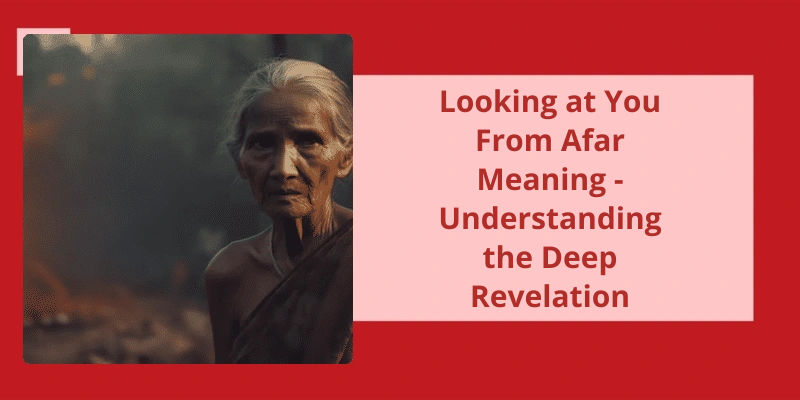There’s something captivating about seeing things from a distance. The idea of looking at something or someone from afar creates a sense of awe and wonder. It’s a reminder of just how small we’re within this vast universe and inspires us to dream bigger. Whether it’s admiring the beauty of a mountain range from a distance or watching your favorite band perform on stage from the back of a crowded venue, there’s a certain magic to experiencing things from afar. The same can be said for gazing at our planet from space, a reminder of the fragility and interconnectedness of all life on Earth. So when we talk about looking at you from afar, it isn’t just a physical distance, but a metaphorical one too. It’s about appreciating the bigger picture and finding beauty in the details that we might otherwise overlook up close.
What Does Adore You From Afar Mean?
For some people, loving someone from afar is a bittersweet experience. It’s a love that isn’t reciprocated, a love that’s unrequited. The feeling of admiration and gratitude towards someone can be overwhelming at times, especially when there’s no hope for a physical connection. However, those who love from afar often find comfort in the beauty of the emotion itself.
Admiring someone from afar allows us to appreciate their qualities without feeling pressure to conform to their expectations. We can admire their talents, their kindness, their intelligence, or their sense of humor from a distance. We don’t need to pretend to be someone weren’t or pretend to be interested in what theyre interested in. We can simply appreciate them for who they are.
Moreover, loving someone from afar can be a source of inspiration for our own personal growth. It can motivate us to become better, to work harder, and to achieve our goals. We can see the best in someone else and strive to embody those same qualities ourselves. We might not be able to be with that person, but we can become better versions of ourselves in the process.
It’s an expression of love that doesn’t rely on physical touch or a romantic relationship. It’s a recognition of the good in someone else and an appreciation for their presence in our lives. Whether the feeling is mutual or not, it’s an emotion that can teach us a lot about ourselves and our capacity to love.
Now that we’ve a clear definition of afar, let’s delve further into the topic and explore it’s usage in text and conversation. Whether it’s to convey a sense of distance or simply to paint a vivid picture, understanding the various meanings of afar can greatly improve your communication skills. In addition, we’ll take a closer look at the Afar language and it’s fascinating history.
What Does Afar Mean in Text?
Afar is a word that’s commonly used in texts and conversations. It’s a simple word that’s used to describe distance. When someone says they see something afar, it means that the object they’re looking at is located at a distance. This word is usually followed by the word off, which emphasizes the distance being talked about. For example, one could say “I see the castle afar off.”
Afar is also the name of an Afroasiatic language belonging to the Cushitic branch. It’s spoken by the Afar people, who’re known for inhabiting Djibouti, Eritrea, and Ethiopia. This language has a unique structure and sound which makes it quite distinct from other languages.
Whats interesting about the Afar language is that it’s one of the few ancient languages still spoken today. It’s evolved over time but still retains many of it’s original features. The Afar language is known for it’s complex verb system, which uses many suffixes and prefixes to convey meaning. This has made it a fascinating subject of study for linguists around the world.
While it’s commonly used to describe distance in texts and conversations, it’s also the name of an ancient language spoken by a unique people in East Africa. This language has endured for centuries and continues to be an important part of the Afar peoples identity and culture.
As we examine the phrase “from afar,” it’s clear to see that it’s multiple meanings and uses. It could refer to distant physical space, such as watching a game from a far away location, or even figurative space, such as admiring someone from a distance. This phrase also has a timeless quality to it, as people have been using it for years to describe various situations. In the next part of this article, we’ll take a closer look at some of the different ways this phrase can be used.
What Does From Afar Mean?
From afar is a phrase that refers to something that’s seen or observed from a distance, typically a great distance. It can refer to physical distance, emotional distance, or even metaphorical distance. For example, if youre watching a concert with a crowd of people, and you see someone arriving from a great distance, you might say “they came from afar to see this band play.”. In this context, it would suggest that the person traveled quite a distance to attend the concert.
Another example is when one views Earth from afar, like from space or from an airplane. The view of Earth from a distance is awe-inspiring, and it’s an experience that many astronauts and pilots have described as life-changing. The Earth is often seen as a beautiful, blue sphere, surrounded by vast oceans and continents. From afar, it’s easy to appreciate the sheer size and complexity of our planet.
When someone loves, worships, or admires another from afar, it usually means that they’ve unrequited feelings for that person, or that there’s some distance between them that makes it impossible for them to be together. This can be a very painful experience for the person who loves from afar, as they may feel a deep sense of longing or loneliness.
For example, if someone is admiring a beautiful painting in a museum, but they can’t afford to buy it, they might say “I love that painting from afar.”. In this context, the phrase suggests that the painting is something that’s admired from a distance, but can’t be owned or possessed.
For example, if someone is facing a difficult challenge in their life, they might say “I can see a solution from afar, but it seems out of reach.”. In this context, the phrase suggests that there’s a solution to the problem, but it isn’t easily attainable.
Now that we’ve discussed the meaning of “afar,” let’s explore the difference between “from afar” and “from far away.” These phrases may seem interchangeable, but there are subtle differences in their usage.
What Is the Difference Between From Afar and From Far Away?
From far away, on the other hand, simply means “at a great distance.”. It’s a more literal way of expressing distance, as opposed to the emotional connotations of afar. For example, you might spot a mountain from far away, or hear a train whistle from far away. It’s a more precise way of indicating distance, without implying any special meaning beyond the physical distance itself.
In popular culture, the two phrases have been used in a variety of ways. In the song “From Afar” by Finnish metal band Ensiferum, the lyrics describe a longing for a distant, mythical land, evoking feelings of adventure and yearning. By contrast, the line “From far away, across the sea” in the Disney classic “The Little Mermaid” is simply a way of setting the scene for the storys location.
Conclusion
Looking at something from afar is to gain a unique perspective that’s both distant and all-encompassing. From this vantage point, we can see the intricacies of our world in a way that’s impossible from close-up. Whether we're watching a sports game or gazing out at the Earth from space, distance provides us with a new way of viewing the world, one that offers greater clarity and broader understanding. In a world where our lives are often consumed by the immediacy of the present moment, taking time to step back and look from afar can be a valuable exercise, revealing to us insights that we may have overlooked or misunderstood before. It’s this distance and perspective that allows us to truly appreciate and understand the world around us.






